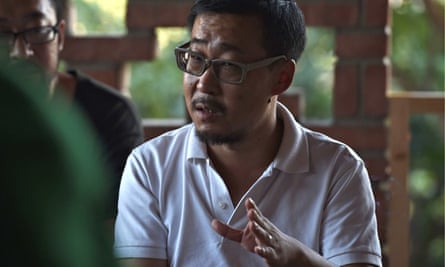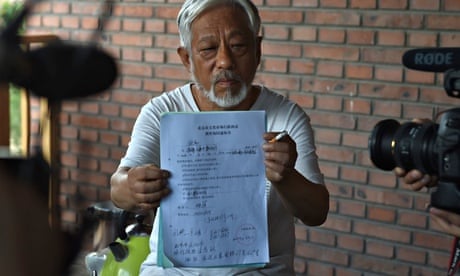Chinese authorities have shut down the country's most prominent independent film festival for the first time in its 11-year history, raising concerns about a wide-ranging government crackdown on freedom of speech and civil society.
The Beijing independent film festival, one of China's leading platforms for the distribution of independent films, has suffered official interference nearly every year since its inception. In previous years, the organisers have simply changed venues or replaced large public events with smaller screenings in private homes.
On Saturday afternoon, about 15 police officers, security guards and rough-looking men in plain clothes stood outside of the office of the festival's organiser, the Li Xianting Film Fund, in a dusty alleyway in suburban Beijing, shoving away the few dozen people who tried to attend.
When a small crowd of directors and would-be audience members gathered on a nearby road, the plainclothes men walked over and demanded they disperse. The men grabbed mobile phones from onlookers and scrolled through saved photos, deleting images of the incident.
"Which agency are you from?" shouted an onlooker.
"We're villagers," one of the men replied.
Over the past year, president Xi Jinping has overseen the most intense crackdown on freedom of speech and civil society in recent memory. Authorities have shut down scores of NGOs, arrested critics for "spreading rumours" online and forced Chinese journalists to pledge not to post their articles on social media sites or share it with foreign reporters.
According to the festival's directors, police detained three of its organisers – Li Xianting, Wang Hongwei and Fan Rong – for about five hours, forcing them to sign documents promising they would not hold the festival. Authorities shut off the venue's electricity and confiscated documents from the organisers' office.
The Li Xianting Film Fund is one of the most influential organisations in Songzhuang, an artist-community in suburban Beijing. The area is a labyrinth of dusty roads running past high brick walls. Some conceal small, coal-heated courtyard houses, home to local farmers. Others house some of the country's most innovative artists, sculptors, photographers and film-makers, who trade ideas in the village's minimalist restaurants and cafes.
While China's independent film scene is flush with experimental and narrative work, some film-makers have built modest careers by exposing some of the less salubrious aspects of Chinese society through scrappy, low-budget documentaries. Their subjects have included tribes facing extinction in the country's far north, the daily lives of coalminers and prisoners on death row. Many have achieved limited distribution at international festivals.

In recent years, authorities have cracked down on independent film festivals in smaller cities as well. Authorities halted a festival in the southern city of Kunming in 2013, and another in Nanjing in 2012.
Wang, the festival's artistic director, said in an interview in late July that authorities had visited his office nearly a dozen times over the past two months. "They come from lots of different departments – they're police, education officials, commerce officials," he said. "In any case, it's not just the security forces and the police coming here – it's the government."
He added: "They understand everything – well, they don't know anything about the films. But they know a lot about our work."
Aside from the festival, the Li Xianting Film Fund – named after its patron, a prominent curator and film critic – hosts a film archive and a summer workshop for aspiring film-makers. This year, authorities barred the fund from using its usual space for the workshop, forcing it to hold classes at a secret location in the countryside.
"Our main goal is to open our students' minds – to teach them new ways to think about life, and about cinema," said Fan, the festival's executive director. "Nothing we want to do is against the party or the government. We're a very transparent organisation."

Comments (…)
Sign in or create your Guardian account to join the discussion